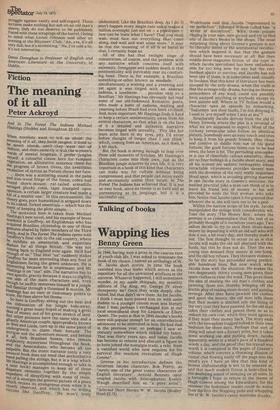Fiction
The meaning of it all
Peter Ackroyd
And In The Forest The Indians Michael Hastings (Hodder and Stoughton £3.15)
When novelists want to tell us. about the meaning of it all, they.build.jungles; itiihsed to be desert islands, -until.they...q.uent otit -of .fashion, and more •receptlyit imia9 ;thewomenls Wards of mental hospitals. 'I prefer -jungles InYself: a colourful clause here for rampant vegetation, an alliterative sentence, there for the progress of brown rivers, the breathless escalation of syntax as Nature shows her face: ". . there was a scattering sound in the palm and iron-wood fringe of the forest, cobra had found shrew-mouse, rat-tailed armadillo. savaged plucky cotia, tapir trampled upon opossum, a certain larger creature had made a kill of a smaller one." In this environment, the theory goes, poor humankind is stripped down to its naked, forked essentials — which has the merit of keeping the plots simple. The' quotation here is taken from Michael Hastings's new novel, and his example of brute mankind is Geoffrey, an Englishman who has acquired Brazilian citizenship in one of those gestures shared by fallen members of the Third Reich. And In The Forest The Indians opens with Geoffrey's final visit to the old country, where he exhibits an amateurish and expatriate disdain for all things British: "He was not coining back to England ever again. He'd had enough of us." That final "us" suddenly makes Geoffrey far more interesting than any host of nglishmen facing the green unknown. He is Interesting because he is unpleasant and Mr Hastings is on "our" side. The narrative has its OW n specific gravity because it stays to slightly one side of the main characters and, even though he swiftly immerses himself in a jungle hell familiar through a thousand B-movies, Mr Hastings has no easy or customary points to score. He rises above his theme.
So here is Geoffrey sitting out the heat and the .exhaustion of his jungle hide-away, nursing a great many hopes of making a great deal of money out of his great stretch of land. But other pioneers have the same idea and a ghastly American couple, appropridtely known as Wes and Linda, turn up in the same piece of Undergrowth to claim their fortune. The intrigue and the adventure mount, and behind It all, lurk Brazilian bosses, who remain stullbornly mysterious throughout the book, and the Amerindians, who become all too Palpable. But the ironic narrator (only a very unusual book does nqt need that authoritative hand pulling the strings, but it is a leap which
Mr Hastings is accomplished enough to take in a. next book) manages to keep all of these
disparate elements together by the simple
expedient of identifying with none of them; out. of it emerges the general picture of a place
which retains its strangeness even when it is closely observed, and which has its willing victims like Geoffrey: "He won't truly
understand. Like the Brazilian does. As I do. It !won't happen every single runt oakie makes a Million overnight just not on — a pipedream — how can he learn what I have? That you must wait, must face out everything that come along, and wait and wait some more." It may be that the 'meaning' of it all is as banal as that; I certainly hope so.
All of this has that twilight tinge of romanticism, of course, and the problem with any narrative which concerns itself with extremity, foreigness and sudden death is that sentimentality will inevitably rear its comforting head. There is, for example, a Brazilian something-or-other known as saudade: ". . . simultaneously a waiting and a yearning and 'yet again it was tinged with an abstract sadness, a loneliness . . . peculiar only to a Brazilian." Mr Hastings has obviously not read some of our old-fashioned Romantic poets, who made a habit of sadness, waiting and yearning before Brazil had even been civilised. And, more important, Mr Hastings finds it hard to keep a certain sentimentality away from his .central characters, so that what is on the face of it a detailed and authentic narrative becomes tinged with unreality: "Pity like hot tears ache burn in my eyes, pity I'd never before thought of longer than I can think" which, coming from an American, as it does, is a bit thick.
"But the book is strong enough to leap over these odd moments of lyricism. Mr Hastings's Characters come into their own, just as the Brazilian jungle acquires its own life. It is very important in a book of this kind that characters can make way for culture without being compromised, and that people can move easily and successfully within their locale. In The Forest The Indians has achieved that. It is not an easy book, since its theme is as hard and as unreassuring as its language, but it is a successful one.


































 Previous page
Previous page